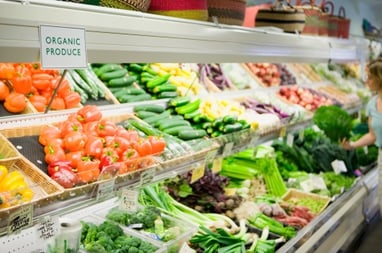 This is always a hot topic and a debate that many people have strong opinions about: should I be buying organic produce? Unfortunately, I don’t have the definite answer for you, either. What I can do is give you some facts and let you decide whether buying organic foods is right for you and your family.
This is always a hot topic and a debate that many people have strong opinions about: should I be buying organic produce? Unfortunately, I don’t have the definite answer for you, either. What I can do is give you some facts and let you decide whether buying organic foods is right for you and your family.
- Organic produce does not have more vitamins and minerals than non-organic produce.
- Organics have a 30% lower risk of pesticide residue than non-organic produce.
- Organic produce typically costs three times the amount that conventional produce costs.
- Purchasing fruits and vegetables from the local farmer’s market is an option for getting more cost-effective organic foods.
- Small amounts of pesticides and other chemicals can have adverse effects on health, especially during fetal development and childhood.
Still confused? Each year the Environmental Working Group identifies foods that have the highest and lowest pesticide residues. Here is a list in order, starting with the highest level of pesticide from 2015:
- Apples
- Peaches
- Nectarines
- Strawberries
- Grapes
- Celery
- Spinach
- Bell peppers
- Cucumbers
- Cherry tomatoes
- Imported sugar snap peas
- Potatoes
- Hot peppers
- Kale/collard greens
Here is a list of foods that are least likely to contain contaminants:
- Avocados
- Sweet corn
- Pineapples
- Cabbage
- Frozen peas
- Onions
- Asparagus
- Mangoes
- Papayas
- Kiwi
- Eggplant
- Grapefruit
- Cantaloupe
- Cauliflower
- Sweet potatoes
When glancing at these two lists, you can see that items on the first list all have edible skins, whereas the skins of the majority of foods on the second list are discarded.
Ways to Reduce Pesticide Residues
Thoroughly washing produce is one way to guarantee you are washing away remaining pesticide residues (pesticides absorbed through roots can’t be washed off, however). Peeling the skins off fruit is another way to decrease the amount of residue; however, you lose nutrients when you throw out the skin.
Take all of this information into account when deciding between organics and non-organics, and then make the choice that best fits your beliefs and budget!
This blog was written by Angie Scheetz, RD, Wellness Coordinator. To find out more about the NIFS bloggers, click here.

